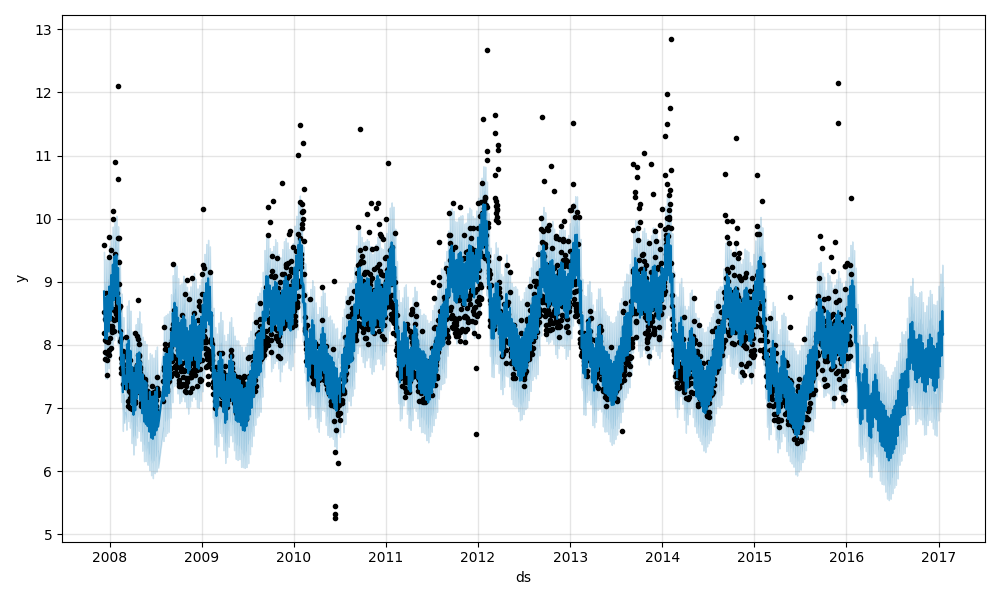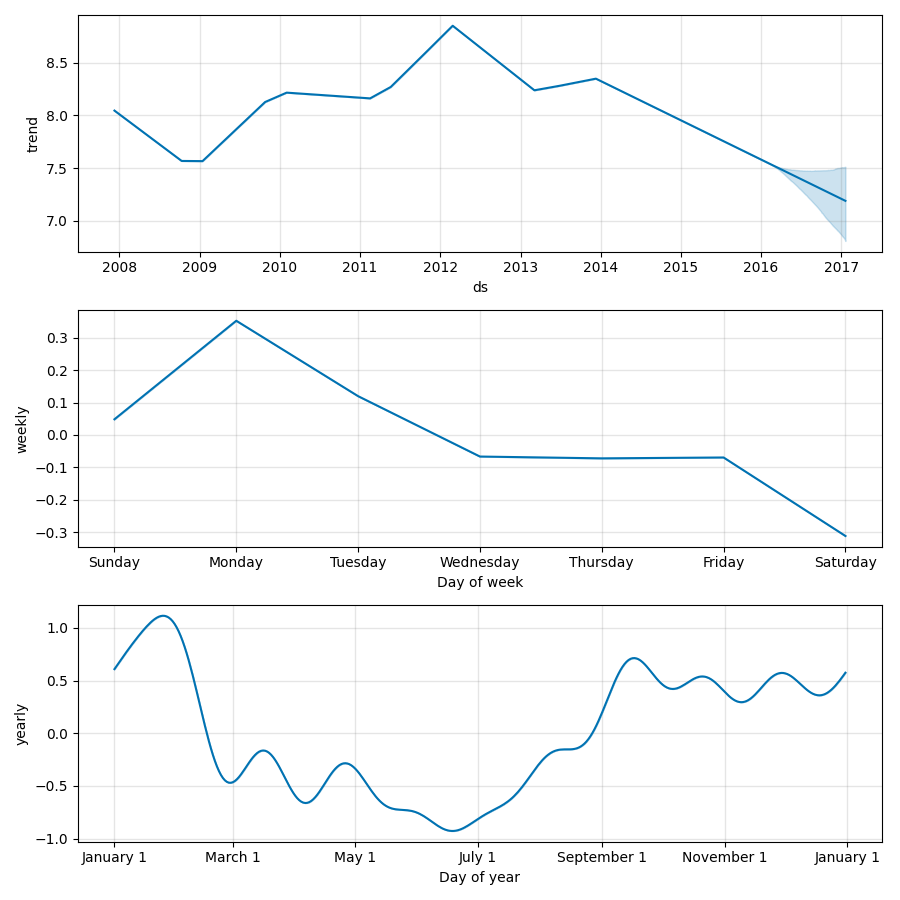https://github.com/ankane/prophet-ruby
Time series forecasting for Ruby
https://github.com/ankane/prophet-ruby
anomaly-detection forecasting
Last synced: about 2 months ago
JSON representation
Time series forecasting for Ruby
- Host: GitHub
- URL: https://github.com/ankane/prophet-ruby
- Owner: ankane
- License: mit
- Created: 2020-04-09T10:01:47.000Z (almost 6 years ago)
- Default Branch: master
- Last Pushed: 2025-06-03T19:26:45.000Z (7 months ago)
- Last Synced: 2025-10-08T02:58:19.659Z (3 months ago)
- Topics: anomaly-detection, forecasting
- Language: Ruby
- Homepage:
- Size: 1.84 MB
- Stars: 426
- Watchers: 9
- Forks: 10
- Open Issues: 1
-
Metadata Files:
- Readme: README.md
- Changelog: CHANGELOG.md
- License: LICENSE.txt
Awesome Lists containing this project
README
# Prophet.rb
Time series forecasting for Ruby, ported from [Prophet](https://github.com/facebook/prophet)
Supports:
- Multiple seasonalities
- Linear and non-linear growth
- Holidays and special events
And gracefully handles missing data
[](https://github.com/ankane/prophet-ruby/actions)
## Installation
Add this line to your application’s Gemfile:
```ruby
gem "prophet-rb"
```
## Simple API
### Forecasting
Get future predictions for a time series
```ruby
series = {
Date.parse("2020-01-01") => 100,
Date.parse("2020-01-02") => 150,
Date.parse("2020-01-03") => 136,
# ...
}
Prophet.forecast(series)
```
Specify the number of predictions to return
```ruby
Prophet.forecast(series, count: 3)
```
Works great with [Groupdate](https://github.com/ankane/groupdate)
```ruby
series = User.group_by_day(:created_at).count
Prophet.forecast(series)
```
And supports [advanced API](#advanced-api) options
```ruby
Prophet.forecast(series, growth: "logistic", weekly_seasonality: false)
```
### Anomaly Detection
Detect anomalies in a time series
```ruby
Prophet.anomalies(series)
```
Specify the width of uncertainty intervals (decrease for more anomalies)
```ruby
Prophet.anomalies(series, interval_width: 0.99)
```
Also supports [advanced API](#advanced-api) options
```ruby
Prophet.anomalies(series, growth: "logistic", weekly_seasonality: false)
```
## Advanced API
Check out the [Prophet documentation](https://facebook.github.io/prophet/docs/quick_start.html) for a great explanation of all of the features. The advanced API follows the Python API and supports the same features. It uses [Rover](https://github.com/ankane/rover) for data frames.
- [Quick Start](#advanced-quick-start)
- [Plots](#plots)
- [Saturating Forecasts](#saturating-forecasts)
- [Trend Changepoints](#trend-changepoints)
- [Holidays and Special Events](#holidays-and-special-events)
- [Multiplicative Seasonality](#multiplicative-seasonality)
- [Uncertainty Intervals](#uncertainty-intervals)
- [Outliers](#outliers)
- [Non-Daily Data](#non-daily-data)
- [Diagnostics](#diagnostics)
- [Additional Topics](#additional-topics)
## Advanced Quick Start
[Explanation](https://facebook.github.io/prophet/docs/quick_start.html)
Create a data frame with `ds` and `y` columns - here’s [an example](examples/example_wp_log_peyton_manning.csv) you can use
```ruby
df = Rover.read_csv("example_wp_log_peyton_manning.csv")
df.head
```
ds | y
--- | ---
2007-12-10 | 9.59076113
2007-12-11 | 8.51959031
2007-12-12 | 8.18367658
2007-12-13 | 8.07246736
2007-12-14 | 7.89357207
Fit a model
```ruby
m = Prophet.new
m.fit(df)
```
Make a data frame with a `ds` column for future predictions
```ruby
future = m.make_future_dataframe(periods: 365)
future.tail
```
ds |
--- |
2017-01-15 |
2017-01-16 |
2017-01-17 |
2017-01-18 |
2017-01-19 |
Make predictions
```ruby
forecast = m.predict(future)
forecast[["ds", "yhat", "yhat_lower", "yhat_upper"]].tail
```
ds | yhat | yhat_lower | yhat_upper
--- | --- | --- | ---
2017-01-15 | 8.21192840 | 7.52526442 | 8.92389960
2017-01-16 | 8.53696359 | 7.79124970 | 9.22620028
2017-01-17 | 8.32439891 | 7.62482699 | 9.04719328
2017-01-18 | 8.15702395 | 7.40079968 | 8.91301650
2017-01-19 | 8.16900433 | 7.45673678 | 8.83486188
## Plots
For plots, install the [matplotlib](https://github.com/mrkn/matplotlib.rb) gem.
Plot the forecast
```ruby
m.plot(forecast).savefig("forecast.png")
```

Plot components
```ruby
m.plot_components(forecast).savefig("components.png")
```

## Saturating Forecasts
[Explanation](https://facebook.github.io/prophet/docs/saturating_forecasts.html)
Forecast logistic growth instead of linear
```ruby
df = Rover.read_csv("example_wp_log_R.csv")
df["cap"] = 8.5
m = Prophet.new(growth: "logistic")
m.fit(df)
future = m.make_future_dataframe(periods: 1826)
future["cap"] = 8.5
forecast = m.predict(future)
```
Saturating minimum
```ruby
df["y"] = 10 - df["y"]
df["cap"] = 6
df["floor"] = 1.5
future["cap"] = 6
future["floor"] = 1.5
m = Prophet.new(growth: "logistic")
m.fit(df)
forecast = m.predict(future)
```
## Trend Changepoints
[Explanation](https://facebook.github.io/prophet/docs/trend_changepoints.html)
Plot changepoints
```ruby
fig = m.plot(forecast)
m.add_changepoints_to_plot(fig.gca, forecast)
```
Adjust trend flexibility
```ruby
m = Prophet.new(changepoint_prior_scale: 0.5)
```
Specify the location of changepoints
```ruby
m = Prophet.new(changepoints: ["2014-01-01"])
```
## Holidays and Special Events
[Explanation](https://facebook.github.io/prophet/docs/seasonality,_holiday_effects,_and_regressors.html)
Create a data frame with `holiday` and `ds` columns. Include all occurrences in your past data and future occurrences you’d like to forecast.
```ruby
playoffs = Rover::DataFrame.new({
"holiday" => "playoff",
"ds" => [
"2008-01-13", "2009-01-03", "2010-01-16",
"2010-01-24", "2010-02-07", "2011-01-08",
"2013-01-12", "2014-01-12", "2014-01-19",
"2014-02-02", "2015-01-11", "2016-01-17",
"2016-01-24", "2016-02-07"
],
"lower_window" => 0,
"upper_window" => 1
})
superbowls = Rover::DataFrame.new({
"holiday" => "superbowl",
"ds" => ["2010-02-07", "2014-02-02", "2016-02-07"],
"lower_window" => 0,
"upper_window" => 1
})
holidays = playoffs.concat(superbowls)
m = Prophet.new(holidays: holidays)
m.fit(df)
```
Add country-specific holidays
```ruby
m = Prophet.new
m.add_country_holidays("US")
m.fit(df)
```
Specify custom seasonalities
```ruby
m = Prophet.new(weekly_seasonality: false)
m.add_seasonality(name: "monthly", period: 30.5, fourier_order: 5)
forecast = m.fit(df).predict(future)
```
Specify additional regressors
```ruby
nfl_sunday = lambda do |ds|
date = ds.respond_to?(:to_date) ? ds.to_date : Date.parse(ds)
date.wday == 0 && (date.month > 8 || date.month < 2) ? 1 : 0
end
df["nfl_sunday"] = df["ds"].map(&nfl_sunday)
m = Prophet.new
m.add_regressor("nfl_sunday")
m.fit(df)
future["nfl_sunday"] = future["ds"].map(&nfl_sunday)
forecast = m.predict(future)
```
## Multiplicative Seasonality
[Explanation](https://facebook.github.io/prophet/docs/multiplicative_seasonality.html)
Specify multiplicative seasonality
```ruby
df = Rover.read_csv("example_air_passengers.csv")
m = Prophet.new(seasonality_mode: "multiplicative")
m.fit(df)
future = m.make_future_dataframe(periods: 50, freq: "MS")
forecast = m.predict(future)
```
Specify mode when adding seasonality and regressors
```ruby
m = Prophet.new(seasonality_mode: "multiplicative")
m.add_seasonality(name: "quarterly", period: 91.25, fourier_order: 8, mode: "additive")
m.add_regressor("regressor", mode: "additive")
```
## Uncertainty Intervals
[Explanation](https://facebook.github.io/prophet/docs/uncertainty_intervals.html)
Specify the width of uncertainty intervals (80% by default)
```ruby
Prophet.new(interval_width: 0.95)
```
Get uncertainty in seasonality
```ruby
Prophet.new(mcmc_samples: 300)
```
## Outliers
[Explanation](https://facebook.github.io/prophet/docs/outliers.html)
Remove outliers
```ruby
df = Rover.read_csv("example_wp_log_R_outliers1.csv")
df["y"][(df["ds"] > "2010-01-01") & (df["ds"] < "2011-01-01")] = Float::NAN
m = Prophet.new.fit(df)
```
## Non-Daily Data
[Explanation](https://facebook.github.io/prophet/docs/non-daily_data.html)
Sub-daily data
```ruby
df = Rover.read_csv("example_yosemite_temps.csv")
m = Prophet.new(changepoint_prior_scale: 0.01).fit(df)
future = m.make_future_dataframe(periods: 300, freq: "H")
forecast = m.predict(future)
```
## Diagnostics
[Explanation](https://facebook.github.io/prophet/docs/diagnostics.html)
Cross validation
```ruby
df_cv = Prophet::Diagnostics.cross_validation(m, initial: "730 days", period: "180 days", horizon: "365 days")
```
Custom cutoffs
```ruby
cutoffs = ["2013-02-15", "2013-08-15", "2014-02-15"].map { |v| Time.parse("#{v} 00:00:00 UTC") }
df_cv2 = Prophet::Diagnostics.cross_validation(m, cutoffs: cutoffs, horizon: "365 days")
```
Get performance metrics
```ruby
df_p = Prophet::Diagnostics.performance_metrics(df_cv)
```
Plot cross validation metrics
```ruby
Prophet::Plot.plot_cross_validation_metric(df_cv, metric: "mape")
```
Hyperparameter tuning
```ruby
param_grid = {
changepoint_prior_scale: [0.001, 0.01, 0.1, 0.5],
seasonality_prior_scale: [0.01, 0.1, 1.0, 10.0]
}
# Generate all combinations of parameters
all_params = param_grid.values[0].product(*param_grid.values[1..-1]).map { |v| param_grid.keys.zip(v).to_h }
rmses = [] # Store the RMSEs for each params here
# Use cross validation to evaluate all parameters
all_params.each do |params|
m = Prophet.new(**params).fit(df) # Fit model with given params
df_cv = Prophet::Diagnostics.cross_validation(m, cutoffs: cutoffs, horizon: "30 days")
df_p = Prophet::Diagnostics.performance_metrics(df_cv, rolling_window: 1)
rmses << df_p["rmse"][0]
end
# Find the best parameters
tuning_results = Rover::DataFrame.new(all_params)
tuning_results["rmse"] = rmses
p tuning_results
```
## Additional Topics
[Explanation](https://facebook.github.io/prophet/docs/additional_topics.html)
Save a model
```ruby
File.write("model.json", m.to_json)
```
Load a model
```ruby
m = Prophet.from_json(File.read("model.json"))
```
Uses the same format as Python, so models can be saved and loaded in either language
Flat trend
```ruby
m = Prophet.new(growth: "flat")
```
Updating fitted models
```ruby
def stan_init(m)
res = {}
["k", "m", "sigma_obs"].each do |pname|
res[pname] = m.params[pname][0, true][0]
end
["delta", "beta"].each do |pname|
res[pname] = m.params[pname][0, true]
end
res
end
df = Rover.read_csv("example_wp_log_peyton_manning.csv")
df1 = df[df["ds"] <= "2016-01-19"] # All data except the last day
m1 = Prophet.new.fit(df1) # A model fit to all data except the last day
m2 = Prophet.new.fit(df) # Adding the last day, fitting from scratch
m2 = Prophet.new.fit(df, init: stan_init(m1)) # Adding the last day, warm-starting from m1
```
## Resources
- [Forecasting at Scale](https://peerj.com/preprints/3190.pdf)
## Credits
This library was ported from the [Prophet Python library](https://github.com/facebook/prophet) and is available under the same license.
## History
View the [changelog](https://github.com/ankane/prophet-ruby/blob/master/CHANGELOG.md)
## Contributing
Everyone is encouraged to help improve this project. Here are a few ways you can help:
- [Report bugs](https://github.com/ankane/prophet-ruby/issues)
- Fix bugs and [submit pull requests](https://github.com/ankane/prophet-ruby/pulls)
- Write, clarify, or fix documentation
- Suggest or add new features
To get started with development:
```sh
git clone https://github.com/ankane/prophet-ruby.git
cd prophet-ruby
bundle install
bundle exec rake vendor:all
bundle exec rake test
```